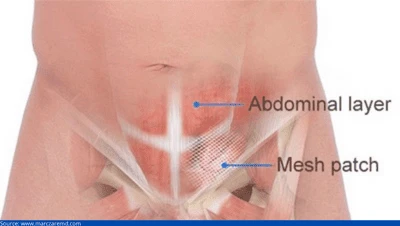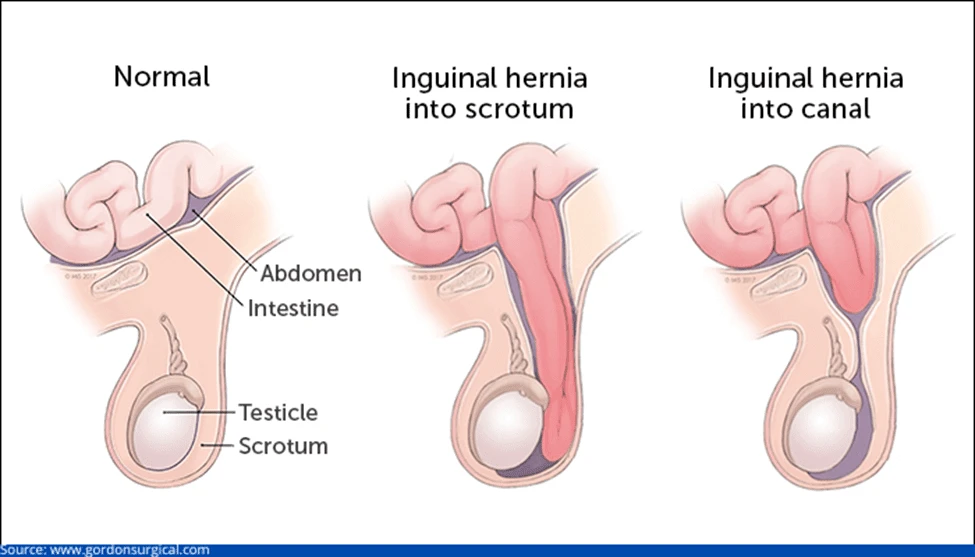Inguinal hernias are pretty common, and researchers reckon that about 27% of men and 3% of women may have an inguinal hernia at some time in their life. An inguinal hernia can occur when tissue, such as a portion of your intestine, pushes through a delicate or weak area in the abdominal muscles. The ensuing bulge may hurt when you sneeze, cough, laugh, cry, bend over, or lift anything heavy.
Though not all hernias cause pain and an inguinal hernia is not necessarily dangerous, it does not recover on its own and can cause serious complications if not addressed in time.
Dr. Harsh Sheth, an accomplished laparoscopic surgeon in Mumbai, says inguinal hernia surgery is a typical method to treat protruding or bulging tissue in the groin area.
What is inguinal hernia surgery?

Inguinal hernia surgery is a procedure to correct an inguinal hernia and close the hole in your abdominal wall. During surgery, your surgeon will make an incision in your groin to reach the hernia or alternatively make small cuts to approach the hernia by the keyhole method. The surgeon will push the hernia back into your abdomen and may place a synthetic mesh over the hole in your abdominal wall to help keep the hernia from returning.
If you have recently undergone inguinal hernia surgery, there are certain do’s and don’ts you must follow to ensure a successful recovery, says Dr. Harsh Sheth.
Dr. Harsh Sheth is among the preferred specialists for people seeking inguinal hernia surgery in Mumbai.
Read on to learn some post-operative care tips for patients discharged from the hospital following a hernia operation.
Foods to avoid when recovering from an inguinal hernia surgery
Spicy Foods: Spicy foods can irritate the incision site and cause discomfort. They can also induce nausea and vomiting. It is best to stick to milder foods until your incision has healed.
Gas-Producing Foods: Foods that are known to produce gas, such as broccoli, beans, and lentils, can cause bloating and pain. Avoid these foods until you are feeling better.
Acidic Foods: Acidic foods, such as tomatoes and citrus fruits, can irritate the stomach and cause heartburn. Avoid these foods until your stomach has healed.
Fatty Foods: Fatty foods can slow down the healing process and cause stomach discomfort. Avoid fried foods, fatty meats, and full-fat dairy products.
Alcohol: Alcohol can thin your blood and increase the risk of bleeding. It is best to avoid alcohol for at least 2 weeks after your surgery.
Processed Foods: Avoid processed foods as they contain a lot of salt and preservatives, which can result in dehydration and constipation.
Caffeinated beverages: Beverages that contain caffeine can also cause dehydration and constipation, and should be avoided for a few weeks after your surgery.
Mumbai’s eminent bariatric surgeon, Dr. Harsh Sheth, recommends following a diet that is high in fiber and staying hydrated to avoid feeling gassy and prevent constipation.
Keep your body relaxed

It is crucial to get adequate sleep during the healing process. Make sure you get 8 hours or more of sleep every night.
The surgical site may become irritated if you wear tight-fitting clothes. Select clothing that is loose-fitting and does not put pressure on or irritate your groin area.
The “heavy lifting” ban serves the sole purpose of preventing abdominal strain. You should wait 3 months before using your abdominal muscles or lifting more than 5 – 6 kg (15 pounds). This lowers the possibility of developing a recurrence hernia and gives your incisions time to heal. One must also avoid squatting and bending down for 4-6 weeks after the procedure.
You should be able to move around on the night of your surgery. Walk a few times in the day to avoid the feeling of soreness.
Dr. Harsh Sheth, a renowned laparoscopic surgeon in Mumbai, adds that walking will improve your breathing, facilitate blood flow from your legs to your heart, and reduces the chances of blood clots in your lower limbs.
Wound care
Unless instructed otherwise, you can take a daily shower with your preferred soap and water to keep the incision and the surgery area clean and help lower the risk of any potential skin infection.
Strictly avoid soaking! The risk of infection rises when submerged in water. So avoid using tubs, swimming pools, or hot springs before being seen at your follow-up visit.
Conclusion

Recovery after inguinal hernia surgery will vary from person to person. However, most people can expect to feel better within a few days to a week. Depending on the type of surgery you had, you may be able to return to your normal activities within a few weeks.
It is essential to take good care of yourself after surgery, so follow your doctor’s instructions for recovery and activity level. Some primary post-op care includes resting, getting plenty of fluids, and avoiding constipation.
- It is important to take it easy and rest for the first few days after surgery. This will help your body heal. It is essential to drink plenty of fluids to prevent dehydration.
- Try to avoid caffeine and alcoholic beverages.
- Constipation can be a problem after surgery. To avoid this, eat a high-fiber diet and drink plenty of fluids. You may also need to take a stool softener.
Following these guidelines will help you recover from your surgery quickly and without complications.
If you have further questions regarding inguinal hernia, post-op recommendations, or hernia surgery cost in Mumbai, please speak with Dr. Harsh Sheth. He is a highly-experienced gastrointestinal surgeon, well-known for safe, reliable, and cost-effective treatment options.

